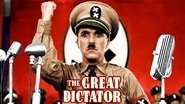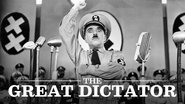CheerupSilver
Very Cool!!!
MamaGravity
good back-story, and good acting
ThedevilChoose
When a movie has you begging for it to end not even half way through it's pure crap. We've all seen this movie and this characters millions of times, nothing new in it. Don't waste your time.
TaryBiggBall
It was OK. I don't see why everyone loves it so much. It wasn't very smart or deep or well-directed.
adonis98-743-186503
Dictator Adenoid Hynkel tries to expand his empire while a poor Jewish barber tries to avoid persecution from Hynkel's regime. The Great Dictator boasts another impressive perfomance from Charlie Chaplin but also hidden messages behind it's comedy plus it also has the infamous scene in the barber shop with you know what soundtrack in it. This film is also super funny and even has Chaplin talking and to be honest i liked the fact that we finally saw him speaking for a while it was nice and his perfomance as a german was just hysterical.. (10/10)
david-sarkies
This is probably the film that Chaplin is best known for, even though it isn't actually one of the films from the repertoire of silent classics. In a way it is not so much a criticism of Fascism in Europe but rather a criticism of US isolationism. However, it doesn't necessarily seem to be that as Chaplin seems to be making a mockery of the fascist dictators in Europe as opposed to actually confronting his viewers with the reality of the situation, and while in a sense we may, at least at this time, consider Hitler to be something of a joke, the reality of the horrors weren't going to come to the fore until much later.The film beings in World War I, where a Jewish barber is fighting on the Front Lines, and then ends up not only saving a pilot, but after crashing the plane ending up in hospital with amnesia. Twenty years later we have him leave the hospital and return to the ghetto to see that in one sense nothing has changed, but in another sense quite a lot has changed. The thing is that the Jews up to that time have always lived in Ghettos, and have always suffered persecution under the hands to those around them, however things seemed to be getting a lot worse.The Great Dictator cuts between Hynkle, who is played by Chaplin, and the Barber, who is also played by Chaplin. The Hynkle scenes are in a sense a lot of slapstick, in a way that politicians are mocked. It is similar with the barber scenes, yet Chaplin seems to be trying to challenge us with the problems that the Jews were living under at the time, and the nature of extreme racism. However, he also seemed to be trying to open our eyes to the fact that this wasn't just the case in Germany, but everywhere. The thing was that nobody particularly cared about the Jews, which is why Hitler was able to get away with what he did, though we must remember that he did work to cover the holocaust up somewhat.It isn't a silent film though, which sort confronted me at least since Chaplin was one of the masters of the silent era. However, I doubt it would have worked as one. What is interesting though are the speeches. Obviously there is the great speech that is delivered at the end, which is in effect let's stop being mean to each other and start to learn to actually get along. We also have Hynkle's speeches which are basically gibberish. At first I thought he may have been just mocking Hitler, but there is also that essence with the idea that it is not the content that actually matters, but the energy with which it is delivered. In a way Hitler, like many other populist politicians, are able to get people on side simply by telling them what they want to hear. Also, one could even suggest that the content could be drastically changed, but as long as the energy that delivered the original speech is replicated, then people will simply continue to follow along blindly, which is why the barber was able to get away with what he did.
Leofwine_draca
THE GREAT DICTATOR is well-regarded as Charlie Chaplin's best movie and it's easy to see why. This is the film in which he mercilessly satirises Adolf Hitler, then at the peak of his ascendancy, while also exploring the persecution of the Jews under the Nazi regime. It's all disguised as another country and regime but we know it's Hitler that Chaplin is taking the mickey out of. It's a broad, character-based comedy all right, but deals with huge and pressing themes, and Chaplin deserves kudos for being the little man who stood up to a tyrant.
bscrivener-50810
In his very first 'talkie' film. Charlie Chaplin proves as he did with his silent work to be impressive and inspirational in this now classic comedy/drama parodying the events leading up to and during the Second World War. The film opens with a Jewish soldier fighting on a fictionalised version of the Western Front for the nation of Tomania. After a near-fatal plane crash, the barber loses his memory and spends twenty years recovering in a hospital, during the same time his country and people are undergoing a radical revolution in the name of a new dictator named Adenoid Hynkel. Considered taboo and even downright dangerous at the time, The Great Dictator shows Chaplin to be more than just an outstanding actor and comedian, but a remorseful and courageous human being standing up to the real world troubles at the time and using his voice as a weapon. This is not just apparent in the beautiful and unifying speech that Chaplin delivers in the third act, but in his depiction of dictators and corrupt rulers. The film will have you laughing, cheering and even crying by the soul-touching finale, which challenges the very concept of human nature and the slow demise of mankind. While Chaplin may have come to pass, his legacy has well and truly lived on in what some consider his finest work. The only minor flaws are a lack of a real soundtrack that could have boosted the emotion, especially in the more serious scenes and some recurring gags that loose their comedic value by the end. 9/10







